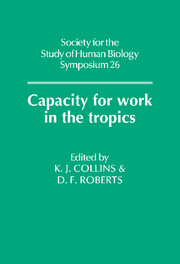Book contents
- Frontmatter
- Contents
- Preface
- Measurement of Working Capacity in Populations
- Functional Consequences of Malnutrition
- Malnutrition, work output and energy needs
- The role of working women in a rural environment when nutrition is marginally adequate: problems of assessment
- Defining anaemia and its effect on physical work capacity at high altitudes in the Bolivian Andes
- Marginal malnutrition in childhood: implications for adult work capacity and productivity
- Marginal energy malnutrition: some speculations on primary energy sparing mechanisms
- Growth, Stature and Muscular Efficiency
- Ethnic and Socio-Cultural Differences in Working Capacity
- Energy Expenditure and Endemic Disease
- Research Models in Tropical Ecosystems
- Index
The role of working women in a rural environment when nutrition is marginally adequate: problems of assessment
Published online by Cambridge University Press: 15 March 2010
- Frontmatter
- Contents
- Preface
- Measurement of Working Capacity in Populations
- Functional Consequences of Malnutrition
- Malnutrition, work output and energy needs
- The role of working women in a rural environment when nutrition is marginally adequate: problems of assessment
- Defining anaemia and its effect on physical work capacity at high altitudes in the Bolivian Andes
- Marginal malnutrition in childhood: implications for adult work capacity and productivity
- Marginal energy malnutrition: some speculations on primary energy sparing mechanisms
- Growth, Stature and Muscular Efficiency
- Ethnic and Socio-Cultural Differences in Working Capacity
- Energy Expenditure and Endemic Disease
- Research Models in Tropical Ecosystems
- Index
Summary
INTRODUCTION
This topic will be dealt with under the second of the two ‘terms of reference1 of this Symposium, which states that one of the objectives is “to assess critically methodology, to identify locations and research problems for field study, and to make proposals for future multidisciplinary investigations on work capacity in the tropics.” This paper will, it is hoped, stimulate ideas and discussion about how nature and degree of the problems associated with marginally adequate nourishment can be investigated in women who have both to run a household and to undertake labour as well.
Much of this presentation is hypothetical – and a sad reflection that is on all the nutritional research which has been conducted on peoples in developing countries during the past 20 or 30 years. We have apparently only recently become aware, in any quantitative scientific manner, of the type of reactions that may occur in marginally nourished populations. In such situations over large parts of the world, in areas where food is not plentifully available, its supply in adequate quantities is spasmodic, dependent primarily on the season of the year – whether pre- or post-harvest. Moreover, it may also be very much affected by the bounty or otherwise of the harvest – as is all too obvious over much of north and central Africa.
In this context flagrant malnutrition is not being considered, but a marginal state where some adaptation might be expected to occur to these severe and recurrent nutritional stresses.
- Type
- Chapter
- Information
- Capacity for Work in the Tropics , pp. 77 - 84Publisher: Cambridge University PressPrint publication year: 1988
- 2
- Cited by

